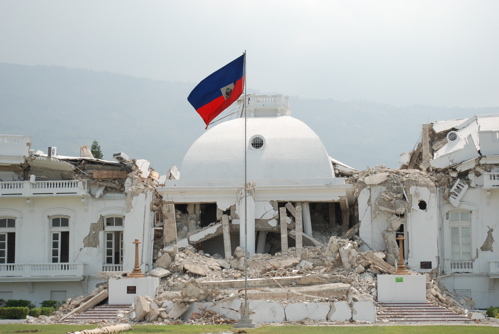
Much hope and many expectations precede the International Donors' Conference Towards a New Future for Haiti, which begins today at the United Nations in New York. All 192 UN member states have been invited to attend the conference. The government of Haiti will formally unveil and discuss its Action Plan for Recovery and Development. It will take money, lots of it, and international cooperation and goodwill to achieve the ambitious goals. Haitian officials are expected to ask for $11.5 billion to rebuild.
Haiti asks its international partners to urgently mobilize the financial resources required to respond to the emergency. To do this, we must create jobs, re-house disaster victims, open schools and higher- education institutions in preparation for the new school year, provide access to healthcare, prepare for the hurricane season, bridge the gap in state tax revenues, restart the administration, and boost the economic channels.
Funds must be made available for this purpose over a period of 10 to 18 months. Budget support is an emergency and can be considered an appropriate financial mechanism in these circum-stances while waiting for scheduled mechanisms to be set up: the Trust Fund and the Interim Committee for the Reconstruction of Haiti.
Donors feel that the money must go towards a sustainable future for the Haitian economy and not be used to fund the corporate mindset of NGOs that thrive on what Naomi Klein (The Shock Doctrine) calls "disaster capitalism."
Speaking to potential donor groups on Monday, Former President Bill Clinton suggested that the best thing aid groups could do for Haiti was to "put themselves out of business," according to an Associated Press Report. What Haiti needs most of all is the encouragement and means to become a self-sufficient nation. Clinton is the United Nations special envoy to Haiti and he finally seems to be saying what desperately needs to be said about Haiti.
Haiti was one of the poorest nations in the Western Hemisphere before the January earthquake that killed upwards of 300,000 people, destroying over 100,000 homes, wiping out much of the infrastructure of the educational and health systems, and most government buildings, including the presidential palace. The death toll did not spare government employees and much of the police force. There are long term and immediate needs.
With the advent of the spring rains, followed closely by the hurricane season, housing and sanitation should be top priorities. Clinton grasps this need and while in Haiti on March 24, he told aid organizations that he was "pleading" with them to do something about getting IDP camp residents to higher ground, suggesting that each IDP camp have at least one hurricane shelter. Whether this is achievable is anyone's guess, but the need is dire.
Special Envoy Bill Clinton said that 20,000 to 40,000 people could die if they are not moved to higher ground. "Here's the problem. If they die, our concern about the services we were going to provide them two weeks from now won't sound very good.... I am pleading with you, if you can do anything about this now." Clinton said that the necessary action will not come from some grand centralized effort, but must be done now by those who have the means to help.
Personally, after seeing what I saw and counting at least 10,000 people on my own without food, shelter or the basics to sustain life -- it could go higher.
Doctors and epidemiologists on the ground agree.
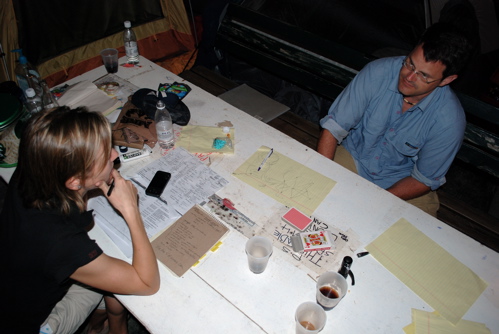
Image: Dr. Jim Wilson and Dr. Tiffany Keenan at work in the field
One of the most persistent voices is Dr. Jim Wilson.
Wilson is the Executive Director of Praecipio International, which is the Haiti Epidemic Advisory System (HEAS), based in Petionville-Port-au-Prince, Haiti. Wilson is also internationally known as the person who identified the H1N1 outbreak in Mexico and was a key player and founder of ARGUS, a global detection and tracking system for the early detection of biological events. He identified SARS outbreaks, H1NI, Marburg hemorrhagic fever, and issued the first warning of H1N1 resurgence in the United States in the summer of 2009. Wilson has been warning about the increase in diarreal disease in Haitian infants, and his warning is falling on deaf ears in the mainstream media.
For anyone who has been to Haiti and observed ground conditions there, the reasons are obvious. During the week of March 12 we were in some of the IDP camps. After a minor rainstorm floodwaters caused the overflow of pit latrines, bringing raw sewage into the camps and contaminating local water sources.
This was in the camps that had pit latrines. A camp of 5,500 people near the slums of Cite Soleil had no latrines or sanitation of any sort. Feces, vomit and urine were everywhere in the surrounding bush. Obviously, contact with raw sewage greatly increases the chance of exposure to waterborne pathogens that cause diarrheal disease. Prior to the January 12th earthquake, diarrheal disease was already a leading cause of illness and death for children in Haiti. Now, children and adults are living in "shelters" that in the best conditions amount to salvaged pieces of tin providing makeshift "roofs," to tattered pieces of plastic held together with sticks.
Housing and medical and food concerns are paramount.
But, what about long-term reconstruction?
Before heading to Haiti, I attended a Miami conference on reconstruction and met another strong voice for the sustainable reconstruction of Haiti. Regine Barjon is a formidable woman and was speaking for the Haitian-American Chamber of Commerce as the CEO of Biotek Solutions.
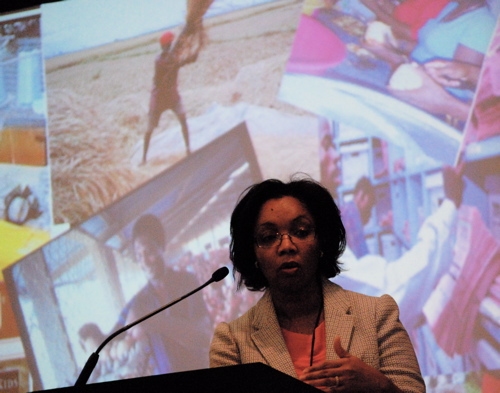
Speaking about rebuilding Haiti's economy, Barjon summed it up by saying "We can grow our own chickens."
In a rural country that imports nine million eggs a day, the implications are obvious. There is no reason for Haiti to be facing food shortages. Barjon says 60% of the Haitian work force is in agriculture. Food security is a top priority, and it will serve to put an end to Haiti importing much of what it can produce at home.
Sugar is a huge resource. But unless there is money to keep the mills in operation and unless the US sugar cane industry releases its stranglehold on imports, Haiti will never resume its annual production capability of 250,000 metric tons of raw sugar. This translates into $100 million a year. Iowa is dumping its rice in Haiti due to the lopsided trade agreements. Barjon says it is possible to increase rice production to meet a potential of $350 million per annum, and poultry to $185 million per year.
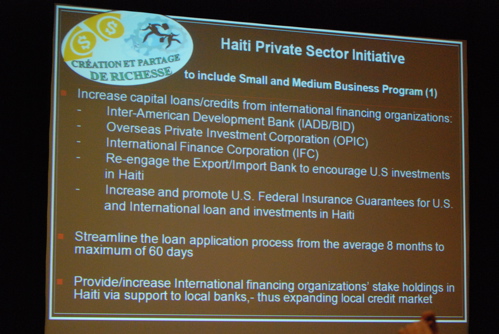
We have had several conversations since, and Barjon has many more ideas that promise solutions instead of band-aids for what ails Haiti.
Obviously crime is an escalating problem, exacerbated by the escape of 2000 hardened criminals. Barjon suggests the creation of a "multi-faceted technical, financial assistance and aggressive training -- and better yet shadowing/partnership -- program with local police and UN forces to curb the potential of crime rate escalation."
"This should also include the creation of local leadership at the neighborhood level and the installation of police and UN forces in these neighborhoods," Barjon adds.
Kidnappings and other crimes hurt not only the victims, but devastate the entire economy. Businesses close, the job market is constricted, and the violence is symbolically visited upon everyone.
The poor should not be excluded from work programs.
Barjon offers the potential in Cite Soleil, one of the worst slums in the world. It would make sense to hire the people there to work towards reforestation, agriculture and clean up of the damaged cities.
But we must act responsibly towards these people.
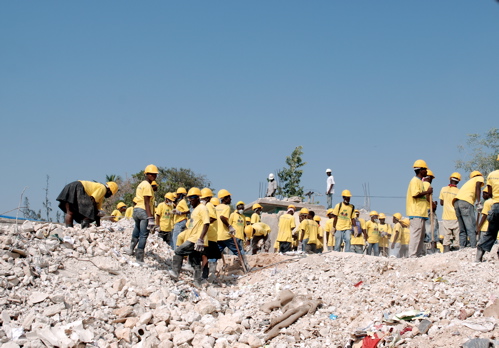
When I was in Haiti, I saw a USAID program called "work for pay," but the people told me they were not being paid. I could hardly believe that the foreman demanded that, as an American, I could do something about the fact that his yellow-shirted work crew, with the USAID logo emblazoned across the front, who were moving rocks and rubble by hand had not been paid their promised wage of $5 US per day. Where is the heavy equipment?
We can do better than this and Barjon offered a good idea.
Why not establish work programs that offer a partnership with the Haitian people and their own police and International forces? Societal breakdown occurs within the vacuum created by the absence of law and order.
Prior to the earthquake, kidnappings rates had dropped tremendously due to UN aggressive policing and fight against kidnappers in partnership with the Haitian police and court system.
Barjon told me that it was not unheard of to hear that before this effort. "Kidnappers had paid off and/or intimidated judges who were barely making a living themselves, Barjon said." She also reminded me that Haiti does not have the highest crime rate in the Caribbean. With the UN so weakened as a result of the earthquake, and the leadership of the UN personalities behind that aggressive fight now mostly gone, "There is an international and local security/police vacuum that needs to be filled expeditiously. YESTERDAY," Barjon said.
With so much of Port-au-Prince in ruins, there is a need to address the influx of IDPs to the rural areas.
Donors can really do some good if they plan for permanent decentralization of urban regions. This will necessitate construction of housing, schools, health and governmental buildings, and the financial and technical assistance in agriculture related projects. Haitians can build and they can feed the emerging communities.
It is up to donors and the NGOs they fund to assure that Haiti does not continue to be an aid-based society. Clinton asked that every dollar donated produce results. It is tall order, but the future of Haiti and her beleaguered people depends on it.
Demands it.
